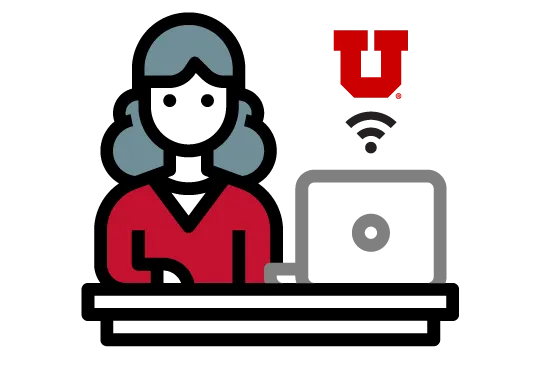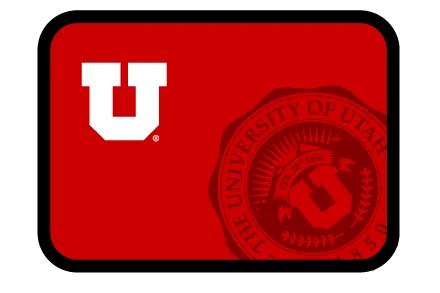About UOnline
At UOnline, we recognize the challenges of balancing education with life’s demands. We designed our online programs purposefully, ensuring you enjoy a flexible learning experience while receiving the high-quality education and support the University of Utah is known for.
Learn more about UOnline at the University of Utah and how we help you achieve more than you can imagine, no matter where you are.

The University of Utah Difference
We’ve been doing this for a long time. Founded in 1850, the University of Utah is ranked among the top 65 research universities globally and recognized for its excellence in education and research. Our reputation extends to our online programs, where we bring the U directly to you. As a student, you can access a suite of resources, connect with our strong network, and graduate confidently from one of the best online colleges in Utah.
Comparing UOnline and On-Campus Programs
Thinking about earning a degree from the University of Utah online? See how UOnline compares to our traditional on-campus options.
What Do They Have in Common?

Accreditation
UOnline and on-campus programs hold the same accreditation with the Association of American Universities. This means that whether you study online or in person, you receive a degree of equal value and recognition.

Faculty & Instructors
The same distinguished faculty who teach on-campus courses also teach online classes. Your education is directly influenced by experts in the field who share their practical experiences with you.

Connection
Stay engaged with your peers and instructors through interactive online platforms. UOnline allows you to ask questions, collaborate, and build meaningful connections, just like you would in a traditional classroom setting.

Degree
Graduate with a respected degree from the University of Utah. Your degree will not indicate that you took your classes online.
How Are They Different?

UOnline Tuition
Tuition rates for UOnline are the same for Utah residents and nonresidents across undergraduate and most graduate programs.
Note: Tuition and fees vary by program and may increase every academic year.

On-Campus Tuition
On-campus tuition varies based on residency status, with higher rates for non-Utah residents.

UOnline Courses
As a UOnline student, you have exclusive access to online courses. These classes cater specifically to your needs, with dedicated space reserved for you.

On-Campus and
Online Courses
On-campus students can enroll in both on-campus and online courses. However, those taking online classes will pay the standard tuition rate applicable to their residency classification, not the UOnline rate.

UOnline Student Services
Enjoy virtual access to student resources, including program advisors, career success services, the University Writing Center, online library tools, IT support, and more.

On-Campus UCard (Student ID)
On-campus students receive a UCard that includes:
- A UTA pass (TRAX/bus pass)
- Access to the Student Life Center
- Free admission to athletic events
- Access to ASUU events
UOnline students do not have access to these fee-supported services, even if they obtain a UCard.
Frequently Asked Questions
Looking for more information about UOnline? Get your questions about admissions, academic resources, and what to expect as an online student answered.
Online learning requires self-discipline, time management skills, and attention to deadlines. You’re responsible for keeping up with course requirements, assignments, and exams. While many online classes include group projects, you complete most of your studying, reading, lecture review, and assignments on your own time. To help you decide if online learning suits you, take our Online Readiness Assessment.
Our student success team and program advisors are happy to discuss expectations, resources, and how you can prepare. If you have questions, email us at uonline@utah.edu!
- Prospective students: UOnline Programs are approved for delivery to residents in all U.S. states and territories. Check our State Authorization page for details. For prospective students outside the United States (including U.S. citizens), please check with your program of interest to learn if they will be approved to accept students from the country you will be residing in at the time you wish to enroll. At this time, only the Master of Business Creation Global Program can accept students from Canada (Ontario), Ghana, Kenya, Nigeria, and South Africa.
- F-1 International Students: F-1 International students residing in the United States are subject to Department of Homeland Security regulations related to enrollment in online programs. Current University of Utah F-1 students should inquire with International Student and Scholar Services (ISSS) prior to enrolling in any UOnline program. Such enrollment may negatively impact maintenance of lawful status.
- Current main campus students: Students who would like to pursue one or more UOnline Programs should talk to their academic advisor. The deadline to request the change is June 30 to start in the subsequent fall semester or November 15 to start in the subsequent spring semester.
You can access all of our campus-based support services, and you can connect with us via virtual appointments. However, you cannot use the following fee-supported services:
- UTA (bus/TRAX) transit pass
- Student Life Center
- Student free-admission game days
- ASUU social events that require a UCard for access
As a UOnline student, you can only register for UOnline courses (sections 290, 291, etc.). You do not have the option to register for main campus courses, including those delivered asynchronously online.
Online courses follow the regular semester schedule, just like our on-campus classes. They start the first day of the semester and end 16 weeks (fall and spring) or 12 weeks (summer) later.
These courses are not an independent study program where you can take nine to 12 months to complete the requirements or accelerate through classes as you understand the material. You are responsible for completing exams, readings, online discussion postings, and group projects within specific timeframes. Your course syllabus, available in Canvas at the start of the semester, will outline all the requirements.
You can choose how to take your proctored exams. You may be able to opt for virtual proctoring using your webcam and computer in your own home. Schedule a test or find out more about virtual testing options.
There may be a small fee for access to these services. An online course could have an average of two to three proctored exams per semester. The course syllabus should provide specific conditions and instructions for exams.
Yes! Our advisors are experts at working with students who are not located near campus. They regularly offer phone or virtual video appointments. Make an undergraduate advising appointment.
If you’re a graduate student, you can find your advisor’s contact information on your program's webpage.
Ready to take the next step toward a UOnline degree? Learn how to apply as an undergraduate or graduate student.
Note: If you are applying to the B.S. in nursing or social work or a graduate program, you must apply to both the University of Utah and to the program.
Newly admitted undergraduate students: Once you are admitted, you must accept admission, pay the $300 nonrefundable enrollment deposit, complete the UOnline Utah Bound Orientation and meet with an academic advisor before being able to register for undergraduate classes. The orientation teaches you how to register for courses, and your advisor will help you select the appropriate courses to build your schedule.
Continuing undergraduate students: If you’re a continuing student, you can find your registration date and time through your Campus Information Services (CIS) account under the registration title. Each semester, we recommend that you refer to the university's academic calendars to determine when your registration begins in order to prepare ahead of time. Additionally, you should refer to the UOnline program’s class schedules, review your Degree Audit and consult with your academic advisor to verify you are on track with your program and degree requirements.
Graduate students: Depending on your graduate program, registration may occur differently each semester. For example, some programs register students after they've verified final grades, while others might have students register starting on a specific date. Whatever the case may be, you must ensure early in each registration cycle that you have cleared any holds that may prevent you from registering.
Undergraduate students: Typically, you should qualify for the same federal financial aid as on-campus students and may qualify for some academic department scholarships. Unless otherwise indicated by the agency, private scholarships may also apply toward your UOnline tuition. You do not qualify for university-administered scholarships, such as first-year, merit and transfer. Review the University of Utah financial aid information.
Graduate students: You should qualify for different types of financial aid for most graduate programs, including federal aid, department scholarships, tuition benefit positions (i.e., graduate teaching assistant), fellowships, and awards. Not all funding opportunities are applied to all UOnline graduate programs, so it is best to connect with the program to discuss options.
Yes! If eligible, you can use your VA benefits. Our Veterans Support Center can help answer your questions about possible benefits.
Undergraduate students: Review the U’s general education and bachelor's degree requirements. Talk to your advisor about the requirements for your academic program(s).
Graduate students: Each graduate program has its own graduation requirements. You can learn more about those requirements on the program page or by reaching out to the department contact.
There are two change deadlines per year for switching from the main campus to UOnline. The deadline to change campuses for the spring semester is Nov. 15, and for the fall semester, it is June 30. You can only change your campus twice during your time at the U.
- If applicable, first meet with a financial aid counselor to learn what impact the switch may have on your aid.
- To change your student status to UOnline, connect with the major advisor for the program you wish to pursue or are pursuing. The major advisor will assist you in submitting your request to the Office of the Registrar.
Note: Making the switch means you cannot pursue an additional credential or major not available through UOnline. This also means you cannot register for any main campus courses, even those taught asynchronously online.
Yes, UOnline programs are eligible for the tuition reduction benefit. Verify whether your employment status meets the eligibility requirements. For specific questions about your eligibility, email the Human Resources Benefits Department at benefits@utah.edu.
Please email us at uonline@utah.edu with any questions you might have. We are here to ensure you get the support you need!
